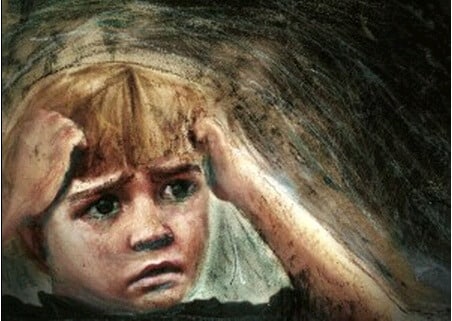Children who suffer adversity in their early childhood carry its scars in their minds for the rest of their lives

This time I wanted to write about "Changes in the Animal Experiments Law", but during the writing I randomly heard, on one of the morning programs on television, an interview with a young man who was abused as a child. The case happened and that same week an article was published in the Proceedings of the American Academy of Sciences (PNAS) discussing the effects of child abuse on the development of an area of the brain called the hippocampus. The changes that this area went through were etched in the brain for many years. The importance of this topic is so great that I decided to write about it. We will leave the discussion of the animal experiments law for the next time.
The hippocampus (which we have already mentioned in the past is so called because its structure resembles a seahorse) is located at the base of the cerebral cortex and is an area of great importance. It is responsible, for example, for spatial orientation and navigation ability, but it is mainly studied due to its centrality in learning and memory processes. People whose hippocampus is damaged are characterized by hyperactivity and defects in learning and memory. For example, they do not remember new events, but are able to remember events that occurred in the distant past.
Already in 1985, they found in rats that a prolonged increase in the concentration of the hormone corticosterone, which causes stress, decreases the number of nerve cells in the hippocampus. Researchers have shown that increased exposure to glucocorticoids, the family of hormones to which corticosterone belongs, causes degeneration of nerve cells and a reduction in the ability to produce new nerve cells. Since then, changes in the volume of the hippocampus due to exposure to corticoids have also been reported in humans, as well as many studies showing that there are also changes in the volume of the hippocampus in a variety of psychiatric diseases.
Recently, studies have been published showing that abuse of children (mainly between the ages of 3-5 years), which causes them to become agitated, manifests itself in changes in the hippocampus which, in a later period, cause psychotic changes. In fact, child abuse is now considered to be the leading cause of mental illness in adulthood, out of the reasons it was possible to prevent them (that is, without including reasons such as hereditary factors). It should be noted that the abuse does not have to be physical, such as beatings or sexual abuse, but can also be verbal abuse.
In an article published in PNAS, a group of researchers from Boston and Harvard University examined whether children who were abused as children indeed suffer from changes in the volume of the hippocampus in adulthood. This research was made possible with the development of advanced methods of magnetic resonance imaging (MRI) and the development of software that allows accurate measurement of the volume of the hippocampus. 193 subjects (73 boys and 120 girls) from different ethnic backgrounds, aged 18-25, were selected for the study. Most of them were in a good financial situation and had more than 12 years of education. They did not use drugs and did not take regular medication. About half of them suffered in their childhood from abuse in various forms, including physical abuse inside and outside the family, sexual abuse inside and outside the family, or threats from parents or other family members.
In 115 of the subjects, various psychotic phenomena were found and the reduction in the volume of the hippocampus was found, especially in the left hemisphere (actually there are two hippocampus in our brain, one in each hemisphere). The abuse during childhood thus caused a prolonged effect of years, similar to the effects of the hormones that cause rickets. In our small country, children are under stress and in stressful situations not only because of abuse. For example, the missile shelling that the people of the south have experienced recently, and in previous years, may also be a factor with long-term effects that must be taken into account.
I do not believe that people who abuse children will read this column or be influenced by it. But, society as a whole must be aware of the impact of child abuse and fight to prevent such phenomena as much as possible.
__________________________________________________________________________________________________________________________________________________________________
for further reading
Childhood maltreatment is associated with reduced volume in the hippocampus subfields CA3, dentate gyrus, and subiculum. Teicher et al. (2012). PNAS, 109: 563-572. www.pnas.org/content/109/9/E563.long
About the author
Yitzhak Ferns is a professor in the Department of Neurobiology of the Hebrew University in Jerusalem, the founder of the Israeli Association for Neuroscience and the founder of Belmonte Youth Labs in Jerusalem.

2 תגובות
I wonder if the religious are able to understand this. And how according to them it is not written in their glorified Bible, even though women have claimed it since time immemorial.
Wow, I enjoyed reading - amazing 🙂
As a person who has experienced many abuses, I do testify to changes in the ways of thinking, creativity (the data presented such as orientation, etc. are indeed correct) and the multitude of ways in which I am aware of the way my mind works.
Painful, but real and there are points that cannot be healed.